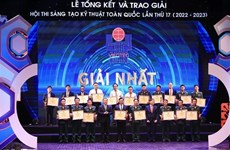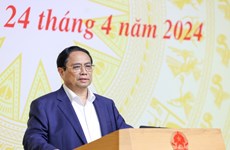Vietnam needs to build relevant solar technology
Director of the Ho Chi Minh
City Energy Conservation Center (ECC-HCMC) Huynh Kim Tuoc said that
Vietnam has great potential for solar power especially in the central
and southern regions of the country, which have many hours of sunshine
and high solar radiation intensity.
Thus, the Government’s
policy should strive to increase the proportion of renewable energy
sources to about 8% of the total primary commercial energy consumption
by 2020 and 11% by 2050. To realise this goal, localities, including Ho
Chi Minh City have actively cooperated with businesses to support users
by up to 1 million per machine.
Thanks to this, in recent years
the market for water heaters using solar energy has grown quickly with
various providers. The Ministry of Industry and Trade (MOIT) shows that
in 2011, the whole country had over 30 industrial works with about
42,000 machines sold each year, an average growth of 20% per year.
Particularly, in Ho Chi Minh City, about 30,000-40,000 machines are
installed each year, one in every two newly built houses is installed
with a water heater using solar energy.
To increase the
localisation rate, in 2009, the Red Sun Energy Joint Stock Company was
the first solar battery manufacturing company in Vietnam.
In
addition, the country has about 90 companies specialising in
manufacturing and trading of solar power products, especially water
heaters. Several models of products have been exported to neighbouring
markets such as Laos, Cambodia and Myanmar.
The number of
machines sold is increasing rapidly and people’s awareness of taking
full advantage of renewable energy sources has been improved , however
the solar power market in Vietnam has left many worried. It is easy to
recognize that Vietnam’s product designs are simple and the scale of
industrial production is not great so is it difficult to compete with
imported products.
Besides, the majority of solar powered
machine manufacturing enterprises in Vietnam are just at the early
stages of production. For example, vacuum tube technology (which makes
up 70% of total products in the market) now has to be imported from
China, and the solar power flat plates are also imported from Taiwan and
Malaysia.
Additionally, a series of projects producing solar
power battery panels in Vietnam are meeting difficulties, which have
caused slow production or even stop production. In April 2011, the US
First Solar Group had to announce the cessation of a project with an
investment of 1.2 billion USD in an industrial zone in southeastern Ho
Chi Minh City after the official launch eight months ago.
The
Management Board of the Chu Lai Open Economic Zone also admitted the
project on solar power battery production by Dong Duong Power Industry
Limited Company with an investment capital of 390 million USD had to
slacken the implementation progress due to difficulties relating to
markets and the manufacturing industry. Most recently, the 300 million
USD project carried out by the Worldtech Transfer Investment Joint Stock
Company in Thua Thien - Hue has also officially stopped.
At a
recent workshop on solar power held by the Ho Chi Minh City Centre for
Science and Technology Information, Director of the Ho Chi Minh City
Department of Science and Technology Phan Minh Tan affirmed that with
solar power technologies Vietnam has not produced, transfer connectivity
solutions is necessary.
The technologies must be suitable with
Vietnam’s climatic conditions, regardless of the technologies of China,
the US or Europe.-VNA












